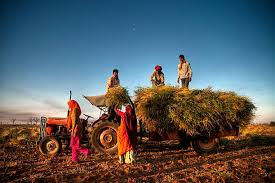Minimum Support Price in Indian Agriculture
- Sanjay Mukhyala

- Feb 19, 2025
- 2 min read
Updated: Feb 19, 2025
The Minimum Support Price of a crop is the price a government buys crops from farmers, serving as a safety net for farmers so they can earn a fair income. It helps farmers by preventing them from selling their crops at very low prices when the market is down.The government sets MSP for some crops before the growing season. It’s based on the cost of growing crops, demand and supply of the crop, market trends, and current food prices for consumers. Simple standards are set to create an ideal price: farmers should get more money than they spend on seeds, fertilizers, water, and labor. If more people need a crop, the price can be higher but not too expensive relative to other food prices, all the while considering past prices and future predictions. Also, physical conditions like drought and flooding influence the MSP of a crop - which is especially important in a climate like India’s.
Once the MSP is set before the season and the harvest finishes, farmers sell their crops at government centers if market prices are too low and store the crops for later use in ration shops. Despite this, there are issues with the MSP system. Not all crops are bought. Especially in India, mostly wheat and rice are purchased, so other farmers may not benefit. Also, many small farmers can’t sell at MSP due to inaccessibility to government buying centers. In terms of infrastructure, India does not have enough space to store all the grains, and the system encourages overproduction to cater towards MSP price rates (farmers grow more wheat and rice but fewer other important crops like pulses and oilseeds).
The Indian government sets MSP for 22 crops, including wheat, rice, pulses, and cotton. The government also includes a fair and remunerable price (FRP) for sugarcane. However, the procurement is heavily skewed towards rice and wheat. For instance, in 2018-2019, only about 24% of paddy and 20% of wheat produced were sold under MSP, with minimal procurement for other crops (Down to Earth). To reduce over-reliance on rice and wheat, the government is promoting the sale of pulses and oilseeds. A six-year program was launched to boost pulse production, aiming to decrease import dependence (Reuters).
MSP is a key component of the Indian agricultural atmosphere, and a very important factor for both farming companies and individual workers.


Comments